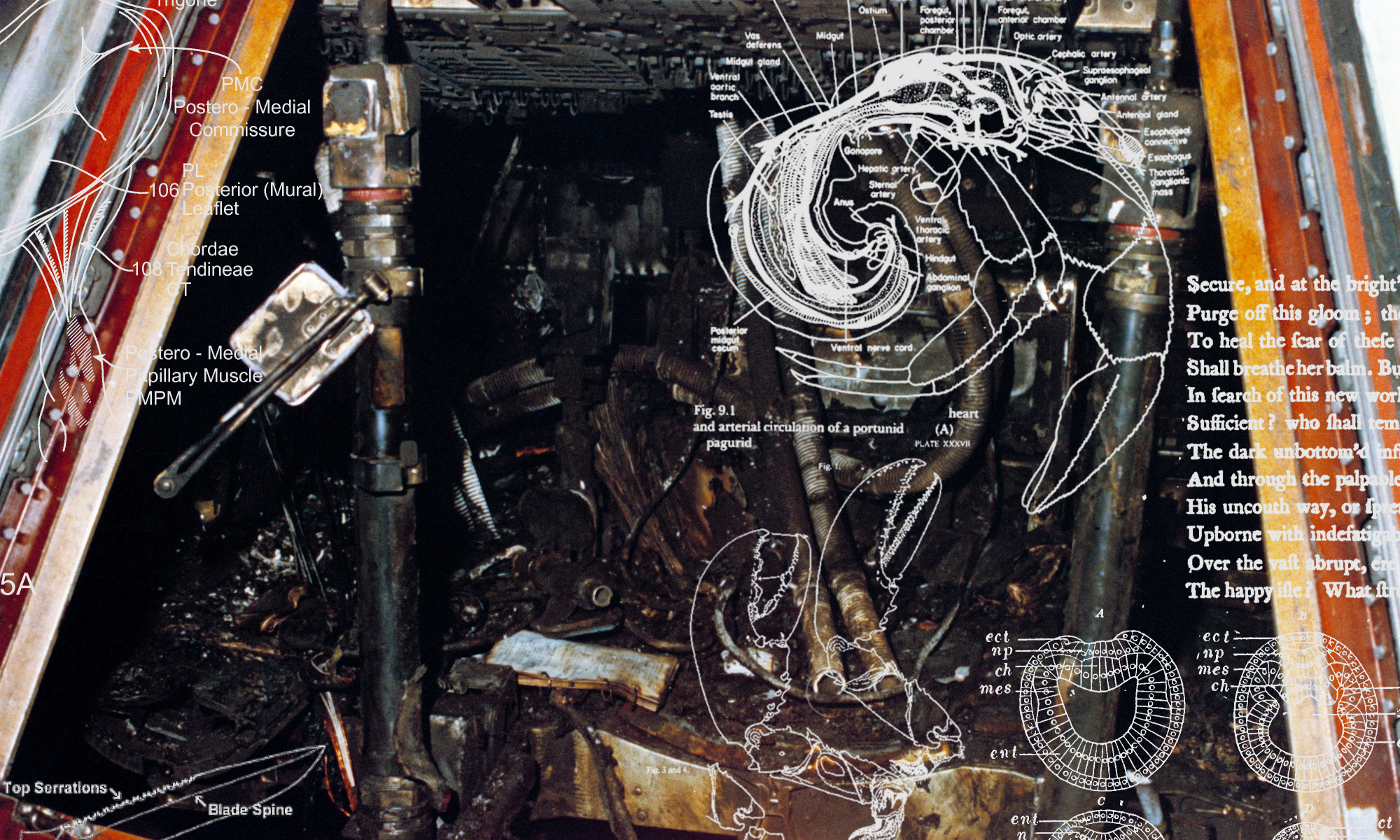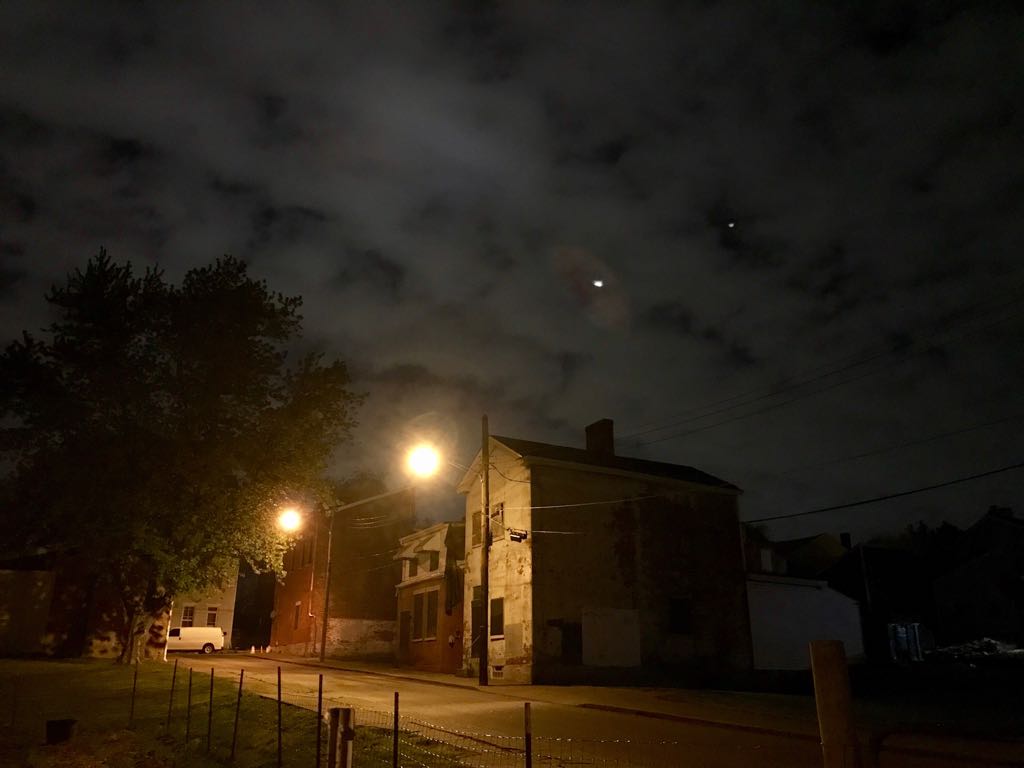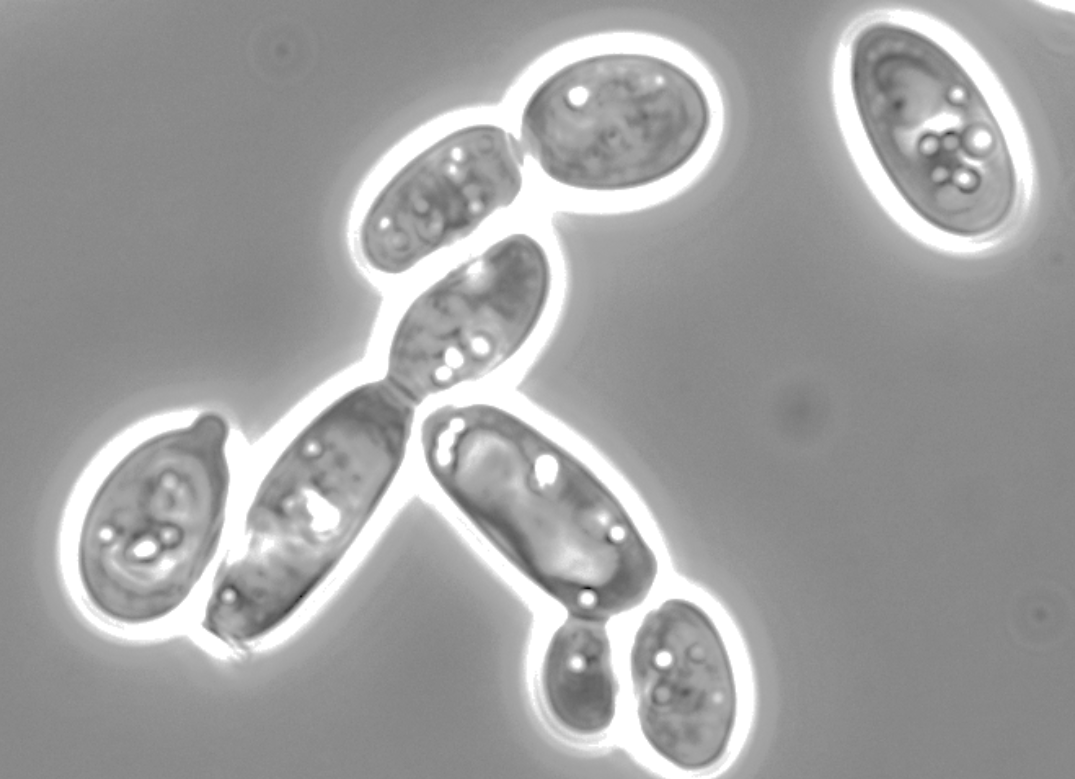Drive down the interstate at night headed north, leaving the city behind. Its form fades to light. A septic glow rotting the sky. Accelerate until the traffic dissipates into the tree-shrouded suburbs, into quiet office parks, into the undead sodium-lit factory complexes.
An old metal bridge up ahead. At the engorged river dotted with the peaks of flooded homes in what used to be the century floodplain. Low forested cliffs pick up on the far bank, looming from the brown water. The cliffs tumble into low hills, smooth into prairie. Last exit before the border. The city seemingly a world and an eternity away, the sucking arms of its light squirming about it in a monstrous container of nighttime. Numbered farm roads and the toothless carcasses of old barns, glowing faintly miles off the road.
A night so black only a cheap horror writer could love it.
The exit is more inviting than the blank vector of highway. If you were to pull off at this exit, the road would immediately turn to shattered asphalt, the bigger gaps filled in by gravel. The window open, cicadas saw in the hot night. To the right is a gas station with an attached Subway, both open 24 hours. There is a single patron, a man in a suit leaning against a gleaming black car, blown out under the fluorescent lights which are attended by a host of mosquitoes and moths. Within the gas station is an attendant, leaning against the counter, engrossed in their phone. Even the sign COLD DRINKS, visible in the window, doesn’t seem enticing. The entire scene is monstrous, a solitary glowing eye seen in the dark.
There is no breeze out here. As the car slows, the wet heat seeps in, brushing your arm. There’s heat lighting off to the right, just above a sagging tangle of dying trees.
The cigarette you flick out the window gleams on the ground, a flare for no one, receding in the mirror. As you move towards the gas station, the road drops out into murky brown water. Should be careful. You stop and get out to see if it’s too deep. There’s no way to know without dipping a foot in.
In the headlights, you can see the small pool swarms with larvae. Best not risk driving through and flooding the engine. Your old car can only take so much. Get back in and turn around, throwing up mud and gravel as you turn into the shoulder and back the way you came. The highway is somehow emptier than the world.
There will be something better up ahead. It’s a long drive.
Past the flooded road and across the dead plains, populated only by mechanical threshers and arachnid waterers chitinously clicking slowly in the moonlight, there is a dead town called Acropolis (population: 350) sitting on a small rise besieged by scrub forest. The Davidson River is at its lowest this summer, the cracked mud alluding to its former width. Old tires, beer cans, scraps of metal sit under what used to be the water line, now bleached and exhumed, tangled in the roots of the dead river grass.
Up the hill is Acropolis’ Main Street. At the end is a small plaza and in its center is a statue honoring the town’s founder standing nobly atop a plinth, both rotted with age but still erect. His arm is outstretched, pointing west to the evening star, likely intended to embody the frontier spirit contemporary to its founding. There is nothing now: only emptiness left to point at, leaving the finger projecting obscenely.
Behind this plaza sits the shuttered Museum of History, in the old Marston House, and within its peeling walls is a photo depicting the street as a beautiful boulevard, lined with trees and wood plank sidewalks, the doors of the shops open to the street’s patrons.
All of that is gone. Power lines cut scissions across the sky, stitching across the devastated canal leading away from the Marston House, swaying in the moist breath rolling off the plain. In the gleam of the moon there is only visible the hollow eyes of facades, of open garage doors leading into long-defunct auto shops. Crumbling drifts of bricks choking the broken off shafts of young trees. Here and there a car is parked along the side of the road, implying activity. Closer inspection reveals it is, of course, empty. All of them is either impossibly old, or if new enough to drive, missing tires or a windshield; which, in fact, is all the more mysterious: Acropolis is completely empty, totally vacant, with no one left even to destroy a outsider’s car in the middle of the night.
At the opposite end of the street, before the eyrie falls away into a thick carpet of brambles, the skyline of the city is clearly visible, butchering the horizon like a glittering knife.
Intersecting Main Street was a narrow, cramped road—more of an alley. Here the trees grew overhead until they knitted into a arch. There were no lights except a wan shimmer off of the water puddled in old tire tracks. But down this road was a single occupied house. Surrounded by a collapsing chain link fence and a yard dominated by overgrowth, set far back from the street. The heavy curtains in the windows nearly obscured the feeble light inside, producing the effect of a thin haze which was a perpetual bane of the occupant.
Within the house’s living room, the occupant sat in a tattered chair upholstered in plaid. He was wearing a bathrobe, and pushing his long, matted grey-black hair behind his ear. He was shirtless and sweating. He held a dirty glass in his hand, nearly empty except for a dark brown alcohol and 3 half-melted ice cubes. Stacks of paper (books, old magazines, last decade’s newspapers) seemed to move like glaciers across the floor. Box fans arrayed around the room failed to moderate the temperature. Above the occupant on the popcorn ceiling was a horrible rash of nicotine stains. The only furniture besides the chair and a small table lamp on the floor was an overturned milk crate on which was placed on overflowing ashtray, stolen years ago from the now-defunct Riviera Casino Hotel. The only decoration was the mounted, poorly-taxidermied head of a deer hanging on the wall from a desperate nail, and a radio, playing talk softly, the voices dissolving into white noise. The time was 3 AM.
With a grunt, the occupant rose from his chair and drank the remainder of what was in his cup, ice cubes and all. He began his routine: turn off the fans, turn up the radio for Foster, hiding upstairs. Car keys and wallet in pocket. Hat on head. Lock the door behind him. Into the cloying heat of the night, simmering with insects. The truck, burnt-orange and grey, brushed by the black foliage hanging low over the gravel driveway.
High beams cutting drifting dust on the highway to Cairo. The sputtering fury of the truck’s engine roaring off the trees crowding the roadside. Trash rolling around the passenger side floor. Windshield a graveyard for a thousand mosquitos. A dead deer cut open by the metal of the guardrail, its head smashed and neck broken. Smell of skunks in through the open window or maybe roadkill. Almost chilly. Cigarette lighter gleaming bloodshot in the darkness. Feel of hand sticking to leather steering wheel in the heat. No one around save for the two rear lights of another car far ahead that keeps disappearing on the far side of the soft hills. Billboards for defunct businesses in graveyard towns. Cop on shoulder asleep in the driver’s seat for hours now. Semis on exit ramps with cab lights on.
Cairo: exit 77. The new factory off the highway waiting for workers, still missing walls. Repose under insect stalks of lights. The restaurant the occupant worked at in high school, single car sky blue in the parking lot with trunk and driver’s door open and a figure in shadow throwing a bag in the dumpster. Houses on the street as the speed limit drops to 35 mph. Some sitting empty with doors open atop shattered concrete steps. A field to the left with an old sign half sunk into the mud. For Sale 35 acres Will Subdivide. Perfect for Shopping Center. Helicopter or drone overhead, blinking red white red white. RVs idling near the entrance at the grocery store leeching power from the grid, idling.
You leave the truck near the only entrance that isn’t blocked off for the night. Lights inside so bright and clinical, blinking tears as pupils dilate. Fingertips and teeth looking even more yellow. Must get a carton of cigarettes. The cart has a stuck wheel. Liquor aisle toiletries section look at magazines. Liquor aisle again. Cereal aisle. Forget that you’re not here for the usual reasons. Sleepy employee at customer service doesn’t notice and walks over after 5 minutes past to check out. She rolls her eyes. Feel cold metal of gun in pocket. Think about how easy it would be. No, no. It’s fine. Ask her when her shift ends to be nice. She doesn’t answer.
Back onto highway where the city sits like stitches holding back the beginning of dawn far off. Knees stiff, sinking into matted fabric of driver’s seat. The world still black under the lightening dome. Cars in drivethru line ready for coffee. Dissipating dew and fading glow from plate glass windows.
Cirrus clouds like streaks of tar. The city obliterated briefly in the furious light of the morning star. Squinting against long streaks of day. Smell of oil and grass. Another cigarette. Press heavier on the gas. Have to get to the destination before the traffic begins, the highway becomes choked with workers heading into the city for the day. He can already hear them stirring, like millions of great cockroaches with human faces. Pour whiskey into the thermos while driving to calm the nerves. The morning star an unblinking eye. Locked in a cyclopean staring contest. Sky all around going the pink of bruised flesh. The city resolves again as the sun departs upward. In dead center a new monolith stretching twice as high as all the other buildings, ordinal, a true skyscraper. Impossibly slender, a single bar of black, of non-information, sonorous omphalos piercing the heart of the sun. A syringe from hell. When did that get there? They must have built it overnight.
Pull off onto shoulder next to flooded creek. Boots crunching the skeleton of a dead bat. Mammoth Lake nearby beyond a copse of dead trees, and Lake Strand Dam 5 miles to the west. The Dam and this new tower are conjoined twins, the same murderous hypercephalic monster, mirrored terrors of engineering, a knife in the neck of the natural order. Drag the old gate secured with a loop of chain back wide enough to drive through and return it behind you. Rattling down the road like a ball in the lotto machine, the old shocks incapable of handling the deeply scarred dirt. Mount the flat rocks and drive through the stream where it cuts across the road after heavy rains with no bridge. No Trespassing Keep Out. Violators Subject to Fines and Imprisonment. Keep the gun close. Finger on trigger.
Goodbye city, farewell Pandaemonium.
Easy easy easy. So easy. Still have the badge from back in the day, the keycard to the generator room. Then even easier: a thousand ways to destroy everything. Throw a wrench into things if necessary (though it’s not elegant). Nothing elegant. Remember the tower. Gravestone of God. Throat tightens. Running out of time. What happens if they start moving out instead of up? Insect people, economic subjugation. Sweaty palms and restored buildings. Too-white teeth grinning over black coffee. Fucking. Fucking. Fucking. Developers, the black magic hooded Baal of the market. Remember as a kid on the stock market floor? Terror even then at bizarre rituals and tickertape reports in staccato demon voice. Reverse glossolalia. Dad was a banker. Good he’s dead. Feed them back to themselves. They will eat their own faces for a profit. Lap up their own brains puddled on the floor if you could commoditize it. The charnel house of the universe, the parasitic insatiability. The forest smells like oil, like electricity, like fish shit. There are no people, remind yourself. There were once. Now it’s just you. You against the cabal that has you dancing on a puppet string or kicking spasmodically with neck in a noose. They aren’t people and if they were they would beg for death for their sins. In your bullets, in your Great Flood, they will find humanity once again right as it slips away, forever and ever. The lake reborn, the cracked dirt upturned mouth. To bear witness to their lungs filling with plastic fiber, with chemical waste, with briny lakewater, screaming as the water rises and pours into their mouths, only ever swam at the gym and unable to cope.
Asked for badge at the guard house. It’s the young kid, older now of course. He remembers you. How are things? Fine, fine. You’re there to surprise someone for their birthday. Um, Mark. It’s Mark’s birthday. Hope things are good on your end. Yeah, can’t complain. Anyway, have a good day. Take care.
Wet branches in the parking lot from last night’s storm. The trees. You’ve thought about this. Necessary martyrs. When the Flood comes they will not be spared. You mutter an apology under your breath.
Hallways still needing new paint, a sky blue faded to arctic white with yellow water stains. 10 feet to the left a monstrous, thrashing, imprisoned fury of water. Every bolt every metal plate sighing with you for release.
You wonder again if you should have called your daughter back in Pandaemonia. But no. If you, if the trees must drown, so must she. The unwillingness to make sacrifices is exactly what is at issue here.
Up the black stairs and past the open window. Sun high now moving much too fast. Perihelion.
The city visible over the trees. The Tower ever taller, now fully four times more so than the next tallest building. In fact, all the other buildings, black and gray blue in the haze of summer, all seemed misshapen, melted. Must be drunk. Like a paper bag in the rain, sluggishly collapsing, bowing to their new emperor.
As you watch the Tower continues to grow.
As you watch it becomes clear, suddenly, there had been a crucial confusion. The Tower is not a figure, not a tower at all. A tearing of the ground. A cut by a cosmic knife through the sky.
The blue peels back. Compromised.
And what had been previously held back came roaring through the opening. ![]()



